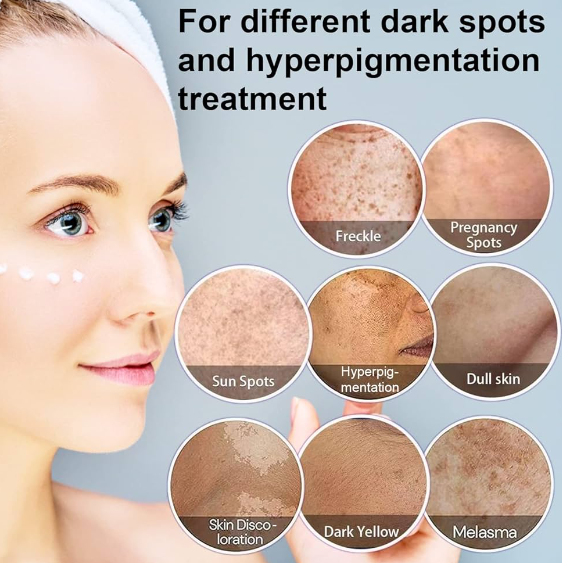BOURSESSENEGAL – Dealing with hyperpigmentation can be frustrating. Dark patches on your skin can affect your confidence and self-esteem. Fortunately, various treatments can help diminish these spots and restore your skin’s even tone. In this comprehensive guide, we will explore the causes of hyperpigmentation, different treatment options, and lifestyle changes to help you achieve a brighter complexion.
What is Hyperpigmentation?
Hyperpigmentation occurs when patches of skin become darker than the surrounding areas. This darkening happens due to an excess production of melanin, the pigment responsible for your skin color. Understanding the causes behind hyperpigmentation is essential for selecting the right treatment.
Common Causes of Hyperpigmentation
Several factors can lead to hyperpigmentation, including:
- Sun Exposure: UV rays can trigger increased melanin production, leading to sunspots or age spots.
- Hormonal Changes: Conditions like melasma often occur during pregnancy or due to hormonal therapies.
- Post-Inflammatory Hyperpigmentation: Skin injuries or conditions, such as acne, can leave dark spots after healing.
- Certain Medications: Some drugs can increase sensitivity to sunlight, contributing to darker patches.
Treatment Options for Hyperpigmentation
When it comes to hyperpigmentation treatment, various options are available. The best treatment for you will depend on the severity of your condition and your skin type.
1. Topical Treatments
Hydroquinone
Hydroquinone is a skin-lightening agent that inhibits melanin production. Often considered one of the most effective topical treatments, it can help lighten dark spots over time. However, use it under the guidance of a dermatologist, as prolonged use can lead to skin irritation.
Retinoids
Retinoids, derivatives of Vitamin A, promote cell turnover and can help fade hyperpigmentation. They stimulate collagen production, improving skin texture while reducing dark spots. Products containing retinol or prescription-strength tretinoin can be beneficial.
Vitamin C
Vitamin C is an antioxidant known for its brightening properties. It can reduce the appearance of dark spots while protecting the skin from further damage caused by UV rays. Look for serums that contain stabilized forms of Vitamin C for maximum efficacy.
2. Chemical Peels
Chemical peels involve applying a solution to exfoliate the outer layer of skin. This process helps remove dead skin cells and encourages new cell growth. Different types of peels can target various levels of hyperpigmentation:
- Superficial Peels: These are mild and suitable for light discoloration.
- Medium Peels: These penetrate deeper and can address more stubborn spots.
- Deep Peels: Used for severe cases, these require longer recovery time.
3. Laser Treatments
Laser therapy can be an effective hyperpigmentation treatment option. Various types of lasers target melanin to break down dark spots without damaging surrounding skin.
Types of Laser Treatments:
- Fractional Laser: Targets small areas to minimize recovery time.
- Pulsed Dye Laser: Effective for red or brown discolorations.
- Q-Switched Laser: Suitable for deep pigmentation and resistant dark spots.
4. Microdermabrasion
Microdermabrasion uses tiny crystals to exfoliate the outer layer of skin. This treatment helps improve skin texture and tone, making it effective for superficial hyperpigmentation. It’s a less invasive option that requires minimal downtime.
5. Natural Remedies
If you prefer natural methods, several home remedies may help lighten dark spots:
- Aloe Vera: Known for its soothing properties, aloe vera can help lighten skin over time.
- Licorice Extract: This natural ingredient contains glabridin, which may inhibit melanin production.
- Green Tea Extract: Rich in antioxidants, green tea can protect the skin and reduce hyperpigmentation.
Preventing Hyperpigmentation
While treating existing hyperpigmentation is essential, prevention plays a crucial role in maintaining healthy skin. Here are some tips to keep in mind:
1. Sunscreen is Non-Negotiable
Applying sunscreen daily can prevent new dark spots from forming. Choose a broad-spectrum sunscreen with at least SPF 30. Remember to reapply every two hours, especially if you’re outdoors.
2. Avoid Direct Sun Exposure
Limit your time in the sun, particularly during peak hours (10 AM to 4 PM). Wear protective clothing, such as hats and sunglasses, to shield your skin from harmful UV rays.
3. Be Cautious with Skincare Products
Certain products can irritate the skin and exacerbate hyperpigmentation. Always patch-test new products and avoid those with harsh ingredients. Opt for gentle formulations, especially if you have sensitive skin.
4. Maintain a Healthy Diet
A balanced diet rich in antioxidants can promote skin health. Incorporate foods like berries, leafy greens, and nuts, which can help protect your skin from oxidative stress.
When to See a Dermatologist
If you’re struggling with persistent hyperpigmentation despite trying over-the-counter treatments or home remedies, consult a dermatologist. They can evaluate your condition and recommend appropriate treatments tailored to your skin type.
Signs You Should Seek Professional Help:
- Dark spots are changing in size or color.
- You experience pain or discomfort in the affected area.
- Over-the-counter treatments aren’t yielding results after several weeks.
Conclusion: Embrace Your Journey to Clearer Skin
Finding the right hyperpigmentation treatment may take time, but with persistence and the right strategies, you can achieve a more even skin tone. From topical treatments to professional procedures, multiple options can help restore your skin’s natural beauty.
Remember, maintaining a consistent skincare routine and protecting your skin from sun exposure are key elements in preventing future hyperpigmentation. Embrace your journey, stay informed, and don’t hesitate to seek professional guidance when needed. Your path to clearer skin starts today
REFERENCE : https://www.health.com/



